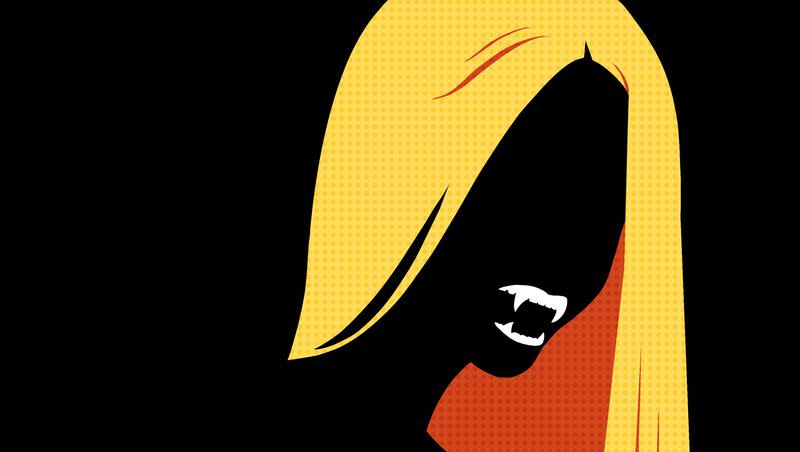Perspective: Are you blond and religious? In Hollywood, that makes you a villain

Fifteen minutes into Episode 8 of “The Last of Us,” my oldest son texted me an impolite epithet about HBO, the cable network that produces the dystopian show.
He knew something I didn’t — that in the video game the series is based on, an evil character named “David” hadn’t been a preacher.
In his new life on HBO, however, David had become Hollywood’s perfect villain: blond and religious. By some miracle of casting, HBO had even found an actor for the role named Scott (wait for it) Shepherd.
My son wasn’t the only one who was bothered by the transformation of a deranged cannibal into a makeshift man of the cloth. In a discussion on Reddit, one person posted: “This decision to make David, a cannibal and (pedophile), also a religious preacher added next to nothing to the story except to denigrate Christianity. It’s pretty clear the creators hate religion when they have to make the worst person in the entire game a Bible preacher.”
Another Reddit user noted: “The issue isn’t just that they changed David to be a preacher, it also reflects poorly on the people following him. They’re all poor, white and stupid enough to take advantage of. That is how the show runners view Christians.”
Hollywood’s penchant for blond villains (think Draco Malfoy of “Harry Potter,” Ivan Drago of “Rocky,” Joffrey Lannister of “Game of Thrones,” Johnny Lawrence in “The Karate Kid” and so on) has been much discussed, with the usual and reasonable explanation being that light hair is the perfect foil for a dark heart.
A similar argument can be made for religious people who turn bad — it’s unexpected, right?
Only it isn’t anymore.
Even with no knowledge of “The Last of Us” video game, it was obvious to viewers that David, who is reading from the Book of Revelation as the show opens, was not going to be the savior of anyone, let alone the long-suffering protagonists Joel and Ellie. The character of David was set up as a plot twist, but was merely a trope.
Like blond bad guys, “churchgoing villain” and “sinister minister” are common tools in screenwriting. A website that catalogues TV tropes includes both of these, noting that the sinister minister is “often a white Anglo-Saxon Protestant ... clean-cut and perpetually smiling while delivering sermons that alternate between gentle reminders of the importance of virtue and scalding fire-and-brimstone rants commanding their followers to rise and smite heathens in the name of the Lord, amen.”
From Pope on “The Walking Dead” to Silas in “The DaVinci Code,” there seem to be more villains aligned with God than the devil himself. It’s no secret why. Producer and actor Mark Wahlberg, a devout Catholic who spent millions of his own money to make a movie about a good priest, has said that religion is “not popular” in Hollywood, which is obvious from how the industry often depicts people of faith.
“I believe in two things: discipline and the Bible,” warden Samuel Norton tells the wrongly imprisoned Andy Dufresne in “The Shawshank Redemption.”
That was all we needed to know about Norton’s character. In film and television, if someone quotes the Bible, odds are, they’re a bad guy, or at least a weirdo you wouldn’t want to associate with. Contrast this to the assumption of millennia past, which was that if someone was able to quote scripture from memory, they were learned and likely of good character.
Related
The transformation of David in “The Last of Us” was especially disappointing because, despite the violence, the show has a worthwhile and surprisingly uplifting theme. It’s about love, and protecting the ones we love, and the series asks serious questions about where good ends and evil begins in that task.
Of course, good and evil are the basis of many Hollywood stories, which is why it’s hard to understand why the industry seems to go out of its way to shut out characters who are good people of faith. (The sitcom “The Good Place” even managed to exclude God in an afterlife swarming with demons.) Maybe it’s because good people are seen as boring (kind of like Utah), when in fact, good people wrestling with angels is more compelling than bad people cavorting with devils.
This is a country in which Richard Paul Evans can be a bestselling author for 30 years, and yet Hollywood is still shocked when a movie like “The Jesus Revolution” is among the top three moneymakers on its opening weekend. (That film was a “box-office surprise” that you couldn’t see coming — unless you knew about the popularity of “The Chosen.”)
Something is wrong when Hollywood goes to the trouble to make sure that it represents witches right, while not showing the same regard for Christians. The FX series “Under the Banner of Heaven,” for example, was built on a demonstrably false representation of The Church of Jesus Christ of Latter-day Saints, which is that the faith “breeds dangerous men.”
But, “when the Deseret News asked if any active Latter-day Saints were hired to help with the production ... a publicist said they would check. They later confirmed that no active church members were paid to write or produce the show. But they did find some active Latter-day Saints working in costume design and with the ‘crew.’”
The best books, movies and TV shows are the ones with plot twists that we didn’t see coming. So here’s a wild and crazy idea for writers: Bible-toting guy in the next zombie apocalypse turns out to be ... good.
We’ll never see it coming, especially if he’s blond.

